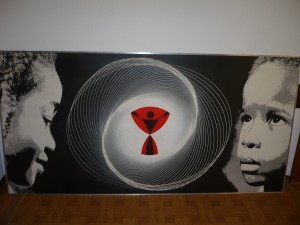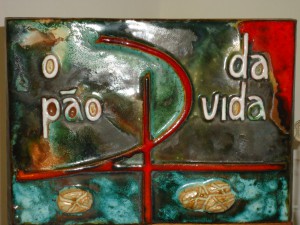A commentary on John 6, 24-35: XVIII Sunday OT: August Second 2015
We go on Reading John’s chapter sixth, which we began to read last Sunday about the sign of abundant bread. Well, from one Sunday to another we jump over a part that speaks about Jesus who disappears from the view of the satisfied crowd, crossing over to the other side of the Lake, and people looking from Him feverishly. What we read today is precisely the answer Jesus gives to people’s search. And in that answer John explains to us the faith of those first disciples in Jesus as the true living Bread.
To understand this answer, I propose a few brief reflections on the various and inter-connected meanings of bread the biblical tradition:
1.- Bread (nourishment) sustains our physical life
There’s an experience among the first ones to mark the history of Israel: that they were able to feed themselves in an extraordinary way and in one of the most difficult moments of their march towards the Promised Land, when in the desert there was no food around. We all know the story of the “mana”; we do not know what exactly happened, though scholars have their theories about its physical feasibility. But the important thing is that whatever happened allowed the people to survive physically and that Israel always saw in that extraordinary experience the presence of the providing God.
I think that something similar happens to us many a time, even if not so extraordinary: When in despair, we find a job that allows to keep up the family, our business starts to go well, we receive an unexpected help, overcame a serious sickness… On those cases we may think that fortune has smiled to us or that we were smart enough to merit that positive outcome… Or we may think that God is guiding history in our favour, using even fortune and our own hard work. This is what the Hebrews thought and what many simple people continue thinking today, with a faith that takes them beyond superficialities and appearances.
2.- From Bread to the Word-Law
When Moses brought the Law to the people in the Sinai, then Israel made the experience that the Law was as big a gift as the physical nourishment in the desert. With the Law the people could organize themselves, make progress, find a way forward in the many moments of doubt, and find harmony, happiness and sense. So little by little Israel began to apply to the Law the same meaning of salvation that had given to the bread in the desert: “not only on bread do human beings live, buy also on any word that comes out of God’s mouth”.
I think that we make an equal experience, individually and as communities. Sometimes we seem to despise the value of laws, but we know that a good Law makes a nation better. Without laws, a nation falls down on anarchy and usually that situation favours the powerful and violent against the poor and peaceful. So to have a good law (or a personal project of life) is as important as to have nourishment.
3.- From the Law to the Word-Wisdom
But Law is not the unique manifestation of that divine wisdom that was guiding the people. There were also the prophets, psalmists, and poets, philosophers from other cultures, religious and political, leaders, wise old men and women… Every manifestation of wisdom was considered, together with the Law, as BREAD for the spirit.
We too need to be nourished by every type of wisdom that humanity produces through science and philosophy, religions and arts…Every positive thinking, every luminous word can help us to live better.
4.- From the Word-Wisdom to Jesus Christ
The disciples’ experience with Jesus is wat is explained in today’s gospel: The bread that nourishes in the desert is no more than an image of Jesus as the true Bread that nourishes our spiritual life. His words, his nearness to sick people and sinners, his entire person is like the Bread in the desert, the Law of Moses, the highest Wisdom of humanity. In Him we find the fullness of that Life that God wants for all his children.
Certainly, we all want our basic need (bread, dress, and roof) covered and Jesus –as the Church today- worries and cares about these basic needs, but He does not remain there; He invite sus to eat the true Bread of Word-Wisdom-Love of God made flesh in Jesus of Nazareth.
To accept this, to “eat” it and make it be part of our life, it’s to open ourselves to a deeper life, able to overcome whatever desert we’ll have to cross.
Fr. Antonio Villarino
Roma





